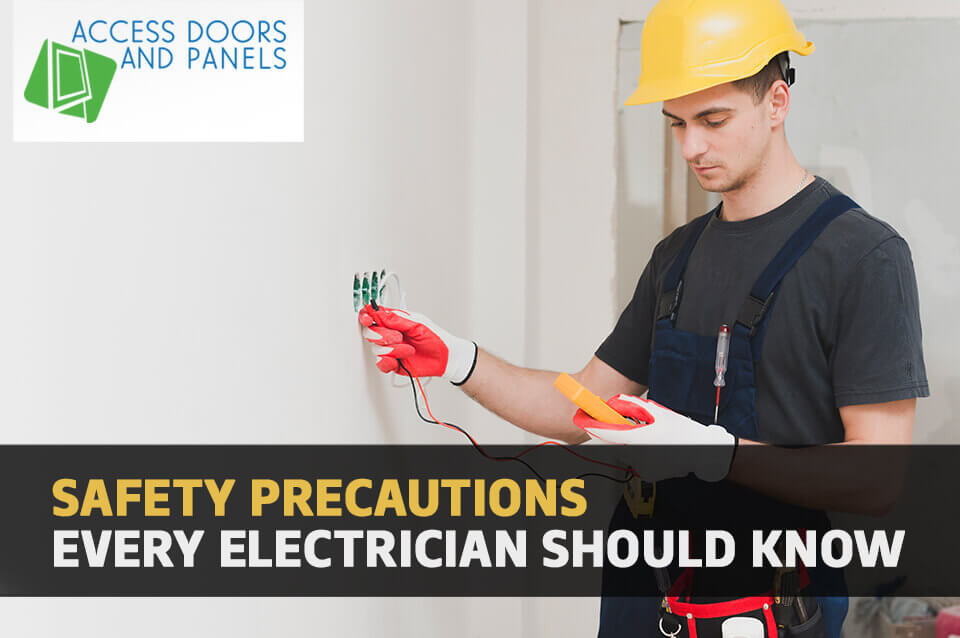Safety Precautions Every Electrician Should Know
Posted by Access Doors and Panels on 8th Jul 2020
When working with electricity, always remember that it can be potentially lethal. Whether dealing with electrical systems in a home, business, or any other setting, the risks are real and must be taken seriously. Understanding and applying safety precautions is essential.
These measures are not just guidelines—they can prevent accidents and save lives. Electricity is powerful, and mishandling it can lead to serious consequences.
The Dangers of Electricity
Before diving into safety tips, it’s crucial to understand why electrical safety is so important:
- The human body is a natural conductor of electricity, making it highly vulnerable to electrical hazards.
- Electrical accidents can cause shocks, burns, tissue damage, and even fatal injuries.
- Direct contact with energized parts can impair brain function, cause breathing difficulties, or stop the heart.
17 Essential Safety Precautions for an Electrician to Know
Here are important precautions to prioritize for safer practices:
- Avoid Water at All Costs
Ensure your hands are dry before handling anything electrical. Moisture significantly increases conductivity, heightening the risk of shock or injury. According to OSHA’s Basic Electricity Safety Guide, even low voltages can cause severe harm when combined with damp hands or wet environments. Always keep the area dry and use equipment suited to the conditions.
- Inspect Your Equipment
Faulty equipment is one of the leading causes of electrical accidents. Before starting, thoroughly inspect all tools, wires, and devices for frayed cords, broken plugs, or damaged insulation. Discard or repair any defective items to avoid hazardous situations.
- Turn Off the Main Switch
Always disconnect the power supply before working on any receptacles or wiring. For additional safety, post a clear sign on the service panel warning others not to restore power while work is ongoing. This simple step can prevent unexpected accidents.
- Use Insulated Tools
Insulated tools offer an added layer of protection against electrical shocks. Ensure all your tools are properly rated for electrical work and free from cracks or wear.
- Beware of Warning Signs
Exposed energized parts and unguarded equipment often carry warning labels like “Shock Risk.” Such hazards can unexpectedly become energized, so always approach them cautiously. Familiarize yourself with your country’s electrical code to better understand these warning signs and act accordingly.
- Wear Protective Gear
Always wear insulated rubber gloves and protective goggles when working on electrical circuits. These items shield you from electrical shocks and injuries caused by flying debris or accidental sparks.
- Never Work on Energized Equipment
Verify that the equipment is de-energized before beginning any task. Use a tester to confirm no current is flowing through the wires. Test cables, metallic coverings on service panels, and any exposed wiring to ensure complete safety.
- Use Appropriate Ladders
Working on elevated electrical systems requires caution. Avoid ladders made from conductive materials like aluminum or steel, as they can create a direct path for electrical surges. Instead, use bamboo, wooden, or fiberglass ladders, safer alternatives.
- Know Your Electrical Code
Electrical codes vary by country; staying up-to-date with them ensures your work is compliant and reduces risks. Regularly review and follow the latest guidelines for safe electrical practices.
- Check Ground Fault Circuit Interrupters (GFCIs) Monthly
GFCIs are essential for preventing electrical shocks, particularly in damp areas like kitchens, bathrooms, or outdoor settings. They disconnect power during short circuits or overcurrent events, minimizing the chance of injury. Test these devices monthly to ensure they’re functioning properly.
- Use Appropriate Circuit Protection
Equip your circuits with fuses and breakers that have the correct current ratings. These devices are designed to disconnect power automatically during short circuits or overloads, helping protect you and your equipment.
- Exercise Caution With Underground Cables
Underground cables pose unique risks, as damp soil conducts electricity efficiently. Use insulated gloves and dig carefully by hand when working near buried wires. Avoid spades or sharp tools, as they can easily damage the insulation and create dangerous situations.
- Cap Live Wires
Always cap the exposed ends on live wires to prevent short circuits and accidental contact. Caps insulate the bare copper ends, protecting against shocks and damage.
- Properly Discharge Capacitors
Capacitors can hold electrical charges long after being disconnected. Use insulated tools to discharge them safely before handling them. For low-voltage capacitors, place the tips of two insulated screwdrivers on the terminals to release stored energy.
- Practice Soldering Safety
When soldering circuit boards, always wear goggles to shield your eyes from sparks and fumes. Place the soldering iron on its stand when not in use to avoid burns or accidental fires.
- Don’t Touch Electrocuted Individuals
If someone is being electrocuted, do not touch them directly, as the current could pass through their body into yours. Instead, immediately turn off the power source and call emergency services. Only approach the individual once the area is safe.
- Always Avoid Power Lines
Power lines are a significant hazard, particularly at construction sites. Even minimal contact can send thousands of volts through your body, causing severe injuries or fatalities. Maintain a safe distance and use insulated tools when working near power lines.
The Takeaway
Electrical work requires strict attention to safety, not only to protect yourself but also those around you. These tips are just the beginning—you can take plenty of other measures to stay safe on your projects.
Incorporating access doors is an often overlooked yet practical way to manage electrical wiring and equipment. Fire-rated access doors help delay fire's progression to critical areas, ensuring essential systems remain accessible. These components keep systems organized and out of sight while allowing for convenient inspections and repairs when necessary.
If you're looking for a dependable solution to secure your electrical wiring and equipment, Access Doors and Panels has you covered. Check our products and request a quote today. You may also contact our team of experts at (800) 609-2917 for personalized advice.

